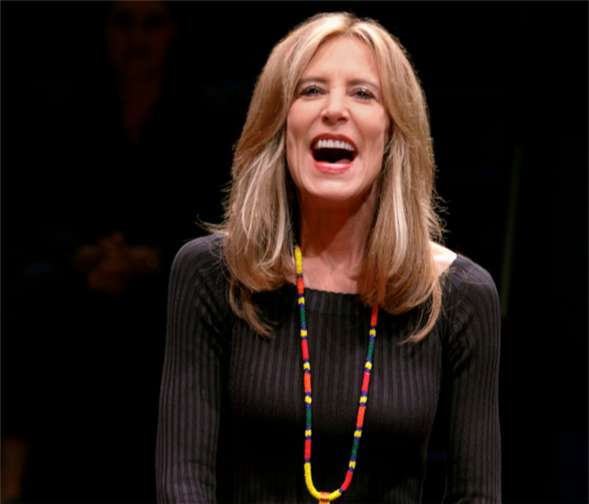Translate Page

How playwright Emily Mann turned Gloria Steinem's life into activist theatre
---
Breaking new ground for women in theatre is nothing new for Emily Mann. The 66-year-old playwright and director, who has served as the artistic director of New Jersey's McCarter Theatre Center since 1991, was the first female to helm productions at many storied regional venues, including Minneapolis' Guthrie Theater. So it's fitting that she's bringing the legacy of feminist activist Gloria Steinem to the stage in her new play Gloria: A Life, currently running at the Daryl Roth Theatre Off-Broadway.
Even though Mann is a generation younger than Steinem, the theatre-maker still faced plenty of gender discrimination, especially early in her career. She recalls an adviser at her alma mater, Harvard University, who told her that writing and directing for the American stage wasn't an option for women -- she should consider doing children's theatre instead.
"I had never encountered sexism until I went to Harvard," Mann recalls. Forty years later, the younger women in Gloria's cast are "dumbfounded" hearing about her experiences. "I was the first woman to direct on every mainstage I ever worked on up until 1989 or 1990," she notes.
That persistence -- and defiance -- connects Mann deeply with Steinem. The playwright and her subject first crossed paths in 1995 backstage on Broadway after a performance of Having Our Say, which Mann wrote and directed. Two decades after that meeting (which also included Anita Hill!), Lincoln Center Theater commissioned her to pen a play about Steinem. During its development, a number of other formidable women came on board, including Christine Lahti, who stars as Steinem, Tony-winning director Diane Paulus and lauded producer Daryl Roth.
Mann is a veteran of translating real-life stories to the stage, including the docudramas Annulla, an Autobiography about a Holocaust survivor, and Execution of Justice about the man who assassinated Harvey Milk. But writing about Steinem, whom Mann credits as a profound influence, was new territory for the playwright.
"I usually work with less iconic people," she says. "I feel like I would not have been able to live the life I've led without Gloria. She is a heroine of mine. Getting past that, and digging deep and connecting in a way that humanized and made this extraordinary woman accessible, was a challenge."
To present a fully formed portrait of the legendary feminist, Mann conducted lengthy interviews with Steinem. Both the personal and political are prominent in this play, which chronicles Steinem's writing and activism as well as her personal relationships. Key events include her 1963 undercover assignment at the Playboy Club, the 1969 abortion speakout, her cofounding of Ms. magazine in 1971 and the 1977 Houston Women's Conference. Her fraught relationship with her mother, who struggled with mental health issues, is also explored. A multiracial, all-female ensemble embodies a variety of women's movement luminaries, such as Bella Abzug, Florynce Kennedy, Dorothy Pitman Hughes and Wilma Mankiller. The offstage creative team is also composed solely of women, quite a statement in an industry that still has a well-known gender parity problem.
But Gloria: A Life is not just a history play, it's very much about where we are now. The 2017 Women's March, #MeToo and Time's Up, and the recent Jeff Flake elevator confrontation are all part of the story, and young modern-day activists including Parkland survivor Emma González appear in video clips. Staged in a circular space with stadium-style seating, the show evokes the consciousness-raising groups of the 1970s, and indeed turns into one during the second act when guests lead conversations inspired by the show's themes -- Donald Trump, the Kavanaugh hearings and the future of Roe v. Wade come up regularly.
And yet, just as Steinem describes herself as a "hope-a-holic" in the play, Mann says she remains one too, even in these reactionary times. "In order to be an activist, you have to be an optimist," Mann says. "Because you're going to get knocked down over and over and over again, and you have to think of the long game. Gloria is both a play and, in some ways, an act of social activism to combat where we are at the moment."
The producers actually timed the show to open just before the midterm elections in an effort to inspire audiences to vote. After all, looking back is the best way to motivate people to change the future. "To understand the present, you have to know the past," Mann says. "As Gloria often says, quoting native people, 'There is the past and there is history, and they are not the same.' What we learn about what has happened to women and people of color in this country is not necessarily the truth. Who is writing our history?"
To read about a student's experience at Gloria: A Life, check out this post on TDF's sister site SEEN.
---
TDF MEMBERS: At press time, discount tickets were available for Gloria: A Life. Go here to browse our current offers.
Carey Purcell writes about pop culture and politics for Vanity Fair, The Village Voice, Politico, and other publications, and blogs at CareyPurcell.com.
Top image: Christine Lahti in Gloria: A Life. Photo by Joan Marcus.